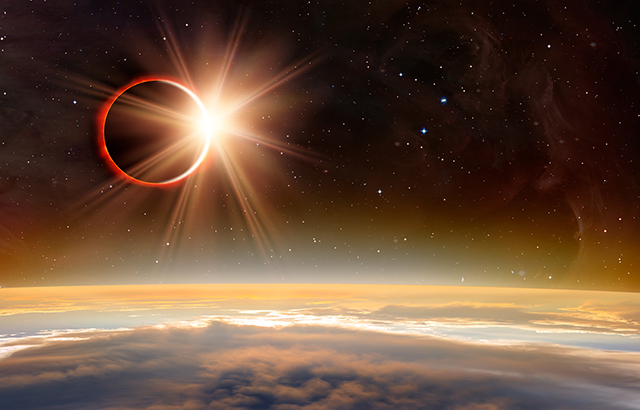NASA to launch rockets into Moon’s shadow during the total solar eclipse on April 8
04/04/2024 / By Kevin Hughes

The National Aeronautics and Space Administration (NASA) is set to launch rockets into the moon’s shadow during the total solar eclipse on April 8.
The American space agency is set to launch three instrument-loaded probes to study how the temporary blocking of sunlight impacts part of the upper atmosphere. The rockets will blast off from NASA’s Wallops Flight Facility – one 45 minutes before, one during and the last one 45 minutes after the local peak eclipse.
The trio of rockets will soar into the ionosphere, a region 55 to 310 miles above Earth’s surface, where particles are electrically charged, or “ionized,” by radiation from the Sun at daytime.
“It’s an electrified region that reflects and refracts radio signals, and also impacts satellite communications as the signals pass through,” said mission leader and engineering physicist professor Aroh Barjatya of Florida’s Embry-Riddle Aeronautical University.
In the evening, the ionosphere thins out as electrons and ions relax and reunite back into neutral atoms, only to break up again the following day. A solar eclipse makes a temporary, localized night that causes the local temperature and ionospheric density to fall and then rise anew.
In this manner, the passage of the Moon’s shadow across Earth sets off both large-scale atmospheric waves and smaller-scale disturbances that can intervene with radio communications passing through the ionosphere.
Simultaneously, the ionosphere can be disturbed by both regular weather and its space-based counterpart. “Understanding the ionosphere and developing models to help us predict disturbances is crucial to making sure our increasingly communication-dependent world operates smoothly,” Barjatya said. “We hope to collect data and then try to infuse it into modeling and study their generation.”
New York State Police calls for residents to stock up on food, water and fuel before the total solar eclipse
Meanwhile, New York authorities have warned residents to be prepared ahead of the total solar eclipse.
In a recent press release by the New York State Police, officials advised people to be prepared for cellular disruptions, slow 9/11 response times, congested traffic and food/water demand during the total solar eclipse. (Related: Why is the National Guard being deployed during the Great American Eclipse on April 8th?)
They also recommended that people stock up on food; make sure they have an adequate supply of their prescriptions picked up the week before; keep cell phone batteries charged; and schedule any essential appointments before or after the eclipse weekend.
“The New York State Police, in close collaboration with other state, local, and federal law enforcement, emergency services, and transportation agencies, has meticulously developed an emergency operation plan. Our unwavering goal is to provide a comprehensive and uniform presence, ensuring the safety of both visitors and residents as they experience and travel home from the eclipse. Members of the State Police will implement security measures appropriate for large gatherings and take all necessary actions to maintain order and smooth traffic flow,” the New York State Police said.
“Building on past experiences, the planning process for this event has been proactive, aiming to address potential impacts within Troop E. Our goal is to minimize any adverse effects associated with the large influx of visitors to the local area. This approach is based on the lessons learned from the 2017 solar eclipse, where some regions experienced a 100 percent increase in their population in the days leading up to and during the eclipse.”
It also stated that Troop E Headquarters will operate as the command post for all state police operations with forward operating bases set up at SP Zone Headquarters situated in Rochester, Auburn and Bath.
Emergency Operations Centers (EOC) will also be located in every county with State Police representatives being placed there.
New York is one of several American states preparing for the total solar eclipse. The statement issued by the officials stressed the significance of being well-prepared in advance of the eclipse.
Follow Collapse.news for more stories about the upcoming total solar eclipse in America.
Watch the video below about the U.S. National Guard being sent out for the total solar eclipse on April 8.
This video is from the Lisa Haven channel on Brighteon.com.
More related stories:
Will the upcoming total eclipse of the sun create a national emergency? Some states think so.
Sources include:
Submit a correction >>
Tagged Under:
Aroh Barjatya, atmospheric waves, Earth, electrons, ionosphere, ions, moon's shadow, NASA, New York, Nineveh, radio communications, solar radiation, sounding rockets, sunlight, total solar eclipse
This article may contain statements that reflect the opinion of the author
RECENT NEWS & ARTICLES
COPYRIGHT © 2017 REAL SCIENCE NEWS





















